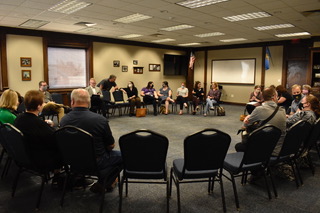Budget shortfall to be addressed this spring

Just before the fall semester ended, staff and faculty senate met with UCO President Patti Neuhold-Ravikumar to discuss what the next year will look like with projected budget cuts. Initially, the university attempted to reduce operational budgets, like materials and nonessential resources, but it did not fill the gap needed to solve the $15 million budget deficit.
“At some point you have to have a reckoning, that it costs a certain amount of money to just do the work, and the cost of doing business,” Neuhold-Ravikumar said. “You can reduce and reduce and reduce, but at some point, you can’t reduce anymore without not being able to do your job — and that is where we are.”
In the faculty senate meeting on Dec. 9, Provost Charlotte Simmons said the same.
“This last year was not the first year that we had cuts, but this is actually moving into the sixth year that we’ve had cuts or maybe more. And so that’s why, for Academic Affairs, we are now in a position where we recognize that further cuts means that we’re looking at faculty lines,” Simmons said.
Neuhold-Ravikumar said faculty and staff are encouraged to see this as an upcoming reality. She said she doesn’t want faculty to have “false hope” that an increase in enrollment will solve the budget issues.
“I believe I can safely tell you that there is no amount of increase that is expected for spring that would address the full $15 million gap,” Neuhold-Ravikumar said. “It’s not fun to hear.”
Official plans on budgetary decisions and faculty layoffs will not be decided until “mid-spring,” Simmons said, as the university plans the budget in March.
Some members of the senate voiced confusion about released budgetary reports, and how the $15 million figure came to be. The President said the university has used cash from “fees leftover” and the capital fund to fill this gap—but the money is running out.
“If there is surplus and we are needing to offset the loss of personnel, this would be a place that we go to to say, ‘Hey, could this buy us some time,’ which is what has happened over the last six years,” Neuhold-Ravikumar said. “It’s been used as a way to buy time, which might not be a satisfactory answer to you, but that’s what has happened.”
When asked about plans for financial exigency, which declares a financial crisis equivalent to collegiate bankruptcy that “threatens the survival of the institution as a whole,” Neuhold-Ravikumar said there are no plans to do so.
“There are no plans for declaring financial exigency. In fact, we’re working as a university to find a path this year to get us out of this situation and keep us away from that option. Everything we’re doing, as painful as it is, is an intention to get us off away from that cliff edge,” Neuhold-Ravikumar said.
The plan, Neuhold-Ravikumar said, is to use the remaining money wisely and introduce greater budgetary cuts to help curb the issue.
The message coming out of these meetings seems to be one of accepting the crisis and gaining resilience.
“We want to get as much input and feel as good as a division as we can about the ultimate decisions that we’re going to make. Please understand that I know no matter what we do, if it involves one person, one job, it’s going to be utterly, absolutely heartbreaking,” Simmons said.
These meetings took place after an invitation-only Q&A meeting between the president and faculty senate discussing budget concerns on Dec. 3.

